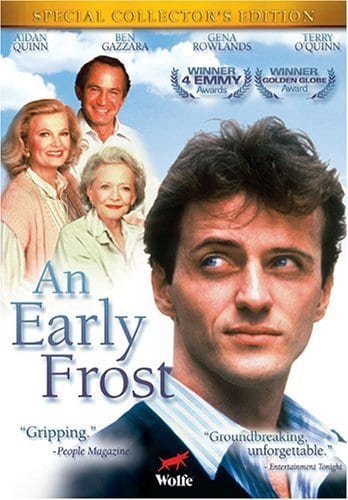 First airing 30 years ago this month, the made-for-television movie An Early Frost — a film about a young, closeted gay lawyer diagnosed with AIDS — was the first film ever to address the then-controversial subject matter. At the time, little was known about the disease and the virus which causes it. Gay men dying of AIDS were all too often considered little more than statistics. Many of those afflicted were outcast from their friends and families. The provocative landmark film dared to give the mysterious and frightening “gay” disease a human face.
First airing 30 years ago this month, the made-for-television movie An Early Frost — a film about a young, closeted gay lawyer diagnosed with AIDS — was the first film ever to address the then-controversial subject matter. At the time, little was known about the disease and the virus which causes it. Gay men dying of AIDS were all too often considered little more than statistics. Many of those afflicted were outcast from their friends and families. The provocative landmark film dared to give the mysterious and frightening “gay” disease a human face.
As a made-for-television movie, the production faced certain challenges. For example, the film required the support of sponsors, many of whom did not want their products associated with the topic. And broadcasting the movie on NBC, a commercial rather than cable network, meant that network censors would scrutinize its content. When it aired, 34 million people watched the film, earning it the night’s no. 1 spot. More viewers watched An Early Frost than that evening’s installment of ABC’s Monday Night Football.
Gay Hollywood couple Ron Cowen and Dan Lipman, men who would later executive produce the NBC television series Sisters and the Showtime series Queer as Folk, wrote the teleplay. Censors demanded that they balance their presentation, meaning essentially that the movie should not condone homosexuality. It was a time when most gay characters in television and movies had been limited to comedic supporting roles. Cowen and Lipman rewrote the teleplay at least 13 times, carefully negotiating revisions with censors with every round, to preserve as much of their story as possible.
It was nominated for 14 Emmys, winning four, including for Lipman and Cowen’s teleplay. The film enlightened and educated the viewing community both to AIDS and to homosexuality. An Early Frost blazed a much-needed trail for similarly-themed movies which followed including 1990’s Longtime Companion and 1993’s Philadelphia. As the writers demanded, the movie ends with hopeful symbolism. Rather than dying, the main character, with his embracing parents watching, rides off into the night in a taxi cab.
— Scott Huffman

